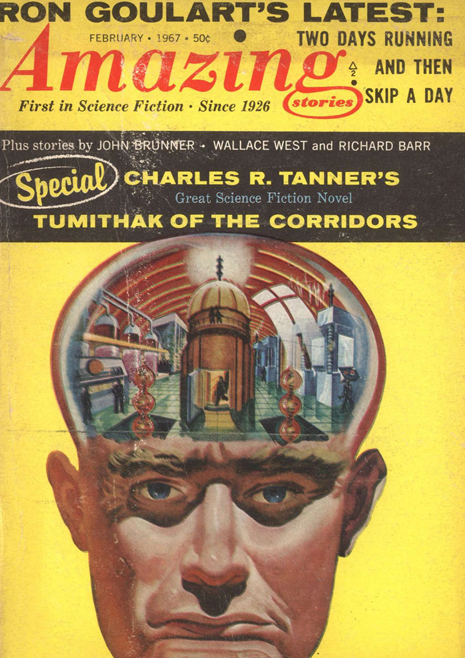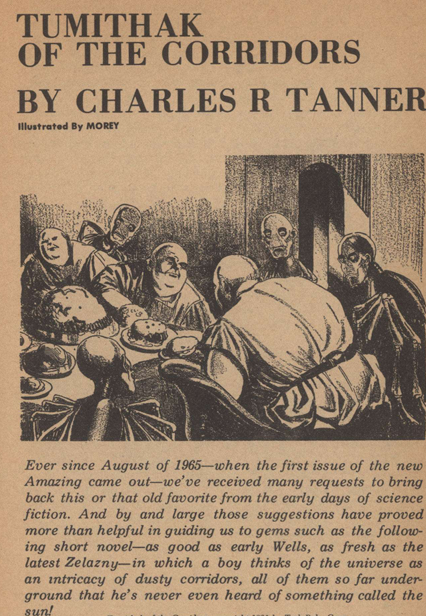
by John Boston
January 6! A portentous anniversary! On this day in 1838, Samuel Morse publicly demonstrated the telegraph, sending a message two miles; and in 1912, German geophysicist Alfred Wegener announced his theory of the continental drift, to much skepticism until very recently.

by Arnold Kahn
The February 1967 Amazing is here too, in a burst of bright yellow surrounding a glum-looking guy who seems to have a head problem. The table of contents captions Arnold Kahn’s cover as Slaves of the Crystal Brain; research reveals it first appeared as the cover of the May 1950 Amazing, where the head was bordered in black rather than yellow. It is hard to imagine why anyone thought the change to be an improvement. However, the subject’s disgruntled expression so acutely characterizes the issue that I fear my comments may be superfluous.
Born Under Mars (Part 2 of 2), by John Brunner
The prolific and versatile John Brunner has provided us with such thoughtful works as The Whole Man and such well-turned entertainments as Echo in the Skull. Born Under Mars, unfortunately, is neither, though it might be viewed as a caricature of both, with an overstuffed action plot against a background of Big Thinks that seem to have been drawn with a crayon.

by Gray Morrow
In the future, Earth has established interstellar colonies, their nations and residents known as Centaurs and Bears respectively. Mars, earlier colonized, has become unfashionable and neglected in this new and larger configuration, and its inhabitants are a bit resentful about it. These include Ray Mallin, a space engineer who has just returned to Mars on a Centaur ship, only to find himself kidnapped and tortured with a nerve whip to obtain information he does not have about the ship he arrived on.
There ensues much to-ing and fro-ing as Mallin tries to find out what is going on, including reliance on outrageous coincidence: Mallin, at the Old Temple containing ancient Martian artifacts, pushes on a random spot on the wall, which opens to reveal the room where he was nerve-whipped, along with one of the perpetrators. He returns the favor of torture and interrogation but his former tormentor knows nothing.
Eventually Mallin corners his old mentor Thoder and the Big Thinks begin to emerge. Humanity is stagnating, with no major scientific breakthroughs for a couple of centuries, and needs to get a lot smarter. How? They don’t really know, but “a pair of strongly opposed societies was devised: the Bears, happy-go-lucky, casual, living life as it came, and the Centaurs, thinking hard about everything and especially about their descendants.” In effect they are trying eugenics by bank shot: creating societies to order to see if either one of them breeds—literally—the intellectual superpeople who are needed (i.e., those who have “a talent—extra psychological muscle if you like”).
And who contrived all this, and how did they manage to keep it secret, and what rational basis is there to believe that anyone can create societies to order and have them stick to the program for the generations necessary for this project? How is manipulating social arrangements and behavior going to jump-start human heredity? Is Lamarck consulting on this project? There’s no pretense of an explanation; these large concepts are merely brandished like slogans on placards.
But—the author asserts—it’s worked! Six generations early, in fact, unto the Centaurs is born an infant who will have “an IQ at the limits of the measurable, empathy topping 2000, Weigand scale, and virtually every heritable talent from music to mathematics, all transmissible to his descendants!” And he’s here! He’s, as Hitchock would put it, the macguffin everyone has been chasing after, torturing Mallin en passant because this miracle child, kidnapped, was brought to Mars on the ship Mallin rode on.
So what’s the plan? Educate him on Mars. “Then, when he’s grown, to use the random mixing of genetic lines available in Bear society to spread a kind of ferment through half the human race.” In other words, this kid is intended to grow up to be a playboy in interstellar Bohemia, and that’s how humanity will be transformed.
But wait—now somebody has snatched the kid away from the people who snatched the kid! More hurly-burly ensues, along with more elevated yakety-yak, and in the last 20 pages a Girl emerges for the hero to get. And there’s a redeeming note: she wants to know what the hell all these people are doing treating an infant like nothing but an object to be manipulated, which doesn’t seem to have occurred to anyone previously.
Born Under Mars is another of many examples of pseudo-profundity in SF: the semblance of large ideas waved around without the author’s doing the work of thinking them through and making them plausible, or abandoning them when their implausibility becomes obvious. Brunner is certainly not the only offender of this sort, but he seems sufficiently capable that I expected better of him.
Bah, humbug. Oh, wait, that was last month. Two stars, mainly for effort.
Tumithak of the Corridors, by Charles R. Tanner
“Special,” says the cover, about Charles R. Tanner’s Tumithak of the Corridors—a “complete novel” at 56 pages per the table of contents. The interior blurb calls it “as good as early Wells, as fresh as the latest Zelazny.” And indeed this story, from the January 1932 Amazing, does have a certain reputation among older fans.

by Leo Morey
It seems that humans made it to Venus, whose inhabitants, called shelks for no reason I can discern, had no idea there was anything outside their eternal clouds. But once they found out, they proceeded straightway to build their own space fleet (“All over the planet, the great machine-shops hummed and clattered”) to invade Earth. Earth responded by creating great underground fastnesses, full of corridors of sorts, and after losing the war, humans fled into their deepest recesses and regressed to ignorance and barbarism. But—of course—one brave young man will not accept humanity’s fate. He has found an old book that recounts the history of the shelks’ invasion, and he is going to find his way the surface to kill a shelk!
This mass of cliches actually turns into a pretty good old-fashioned story. Tanner’s style is clear and uncluttered. Tumithak is presented as heroic but not superhuman. His odyssey through the corridors, including the territories of other human tribes (one of them not too friendly), manages not to become any more ridiculous than the starting premises, except for a portion towards the end in the territory of the Esthetts (sic!) which is all right because it’s purposefully satirical. Altogether, the story is a fairly charming relic. Three stars, and by the standards of its times it would merit more.
Methuselah, Ltd., by Wallace West and Richard Barr

Methuselah, Ltd. (from Fantastic, November-December 1953), is as you might guess about immortality, or its absence. In the future, disease, disability, and aging have been conquered by the Life Ray, but people still die around age 90. Dr. Weinkopf, age 88, would like to do something about this, and he thinks it has something to do with the pineal gland, and with “brain sand”—calcareous salts with a “concentric laminated structure” found in the brain after death, it says here. Surgery has been made illegal, but there is an underground Society for the Preservation of Surgical Techniques that performs operations in speakeasy fashion before an audience of sadists. Dr. Weinkopf hopes to piggyback on a brain tumor operation to remove the pineal and dig out the brain sand. But the patient, hearing talk of this plan, chickens out and leaves. By the rules of the Society, the jilted surgeon must be subjected to surgery himself, so the doctor chooses to have his nurse do the surgery on him, with predictable bad end looming as the story ends. This is apparently intended as a sort of farcical black comedy, but it’s not especially funny and is just as big a mess as my description suggests. The authors should improve their farce technique by studying the works of Ron Goulart—not the kind of sentence I ever expected to write. One star.
The Man with Common Sense, by Edwin James

by Leo Morey
The other reprinted short story, from the July 1950 Amazing, is The Man with Common Sense, by Edwin James, an early pseudonym of James E. Gunn. It’s another dreary farce, though better-wrought than Methuselah, Ltd. Malachi Jones is a “dapper, wizened little man” equipped with cane and derby hat who is an interstellar insurance agent for Lairds of Luna. Lairds has issued a policy guaranteeing peace on Mizar II, and Jones is there to make sure Lairds doesn’t have to pay off. He tames the planet’s rebels and makes peace in the accidental company of one Rand Ridgeway, who is distinguished mainly by his stupidity (en route, he takes his shoes off and forgets to put them back on). Two stars, barely. Here’s another case for Ron Goulart.
Two Days Running and Then Skip a Day, by Ron Goulart

by Gray Morrow
Speaking of Ron Goulart, here is the man himself, with the issue’s only new short story, Two Days Running and Then Skip a Day. Goulart has been on a tear about the medical profession for a while; see his Calling Dr. Clockwork in the March 1965 Amazing, about a man who winds up in the hospital and then can’t get out, and Terminal, in the May 1965 Fantastic, about a nursing home system designed mainly to get rid of the troublesome elderly and the even more troublesome investigators. Here, Goulart tees off, or I should say flails in all directions, against celebrity doctors who can’t be bothered with their patients, robot assistants of dubious competence, modern apartments and appliances that are badly built, sleazy landlords, and I probably missed something. It’s insubstantial but amusing, which seens to sum this writer up, and to compare favorably with Gunn and West/Barr, whose entries are merely insubstantial. Three stars, barely.
Summing Up
As I said at the beginning, the expression on the cover acutely captures the contents of the issue, and requires no elaboration.

by Arnold Kahn (detail)
[Come join us at Portal 55, Galactic Journey's real-time lounge! Talk about your favorite SFF, chat with the Traveler and co., relax, sit a spell…]

![[January 6, 1967] Happy Anniversary (February 1967 <i>Amazing</i>)](https://galacticjourney.org/wp-content/uploads/2022/01/amz-0267-cover-465x372.png)

![[November 24, 1966] Middling (December 1966 <i>Amazing</i>)</big></b>](https://galacticjourney.org/wp-content/uploads/2021/11/amz-1266-cover-503x372.png)








